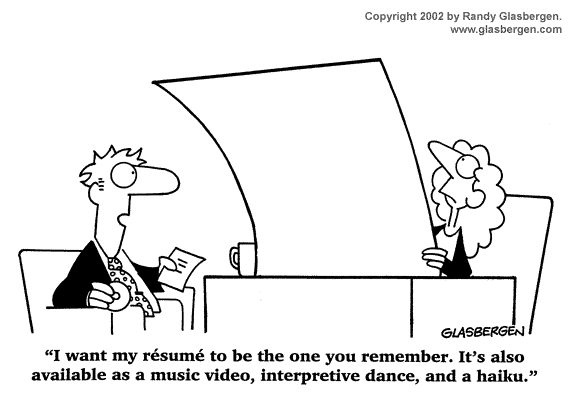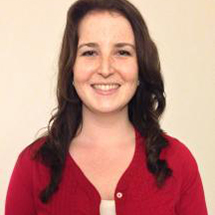 source: Randy Glasbergen
source: Randy Glasbergen
You’ve picked the college, started to submit materials, and began writing draft #239 of your personal statement. Then you get the invitation to interview. Having now been on both sides of the table, I can say that being the interviewee can be really stressful, and I sympathize with you. Here are a few tips for rocking it:
Don’t skip the interview. If you’ve been given the opportunity, accept the interview. This might go without saying, but I have spoken with high school seniors who skip out on the interview for whatever reason—feeling too nervous, don’t think it matters, don’t have the time, etc. The interview is not your entire application, but it is an important part. Don’t skip it.
Don’t spend time on GPA or test scores. Your application packet has all of this information already and role of the interviewer isn’t to regurgitate it to the admissions committee. This doesn’t mean you can’t mention it to them, but it would be more valuable to tell the interviewer something that isn’t conveyed through your application.
Show passion, direction, interests, or projects. You are not expected to have mapped out your future life, career, and goals, and remember: no one is holding you to what you said, nor will they follow up and chastise you for changing your mind. However, you do want to have interests and broader ideas to develop a narrative around. For instance, this can be how you want to tie together your experiences in volunteering at a homeless shelter and your academic excellence in political science to work on policy to increase affordable housing. Or, how your experience tutoring your learning disabled classmates helped you realize that there is a real dearth of software that could be incredibly useful to this group.
Remember, your interviewer wants to learn about you. People enter these interviewing roles because they want to learn more about you. They are excited about their college and want to share that excitement with an incoming generation. While it’s possible that you may get some crabby old guy, most likely you will be speaking with someone who genuinely wants to learn how you could be a good fit for this college.
Charisma and engagement matter, but they can be learned. It always helps your interview if you can engage your interviewer, and speak clearly and confidently. Some people are naturally incredibly smooth in conversation, but most people will be feeling awkward and nervous for such an important day. Fortunately, this is a case where practice makes perfect. Print out a list of possible interview questions and have your parents, friends, and teachers simulate an interview. Try to make this as realistic as possible—if you mess up, don’t laugh and start over, practice how to gracefully recover. Remember, interviewers aren’t looking for perfect orators but simple things like a firm handshake, looking them in the eye, and speaking clearly can make a world of difference.
Ask your interviewer questions. If your interviewer is an alumni, this can include a whole host of questions, including why did they choose to attend X college, what was their favorite part of college, how did the college (or their major) help them to where they are today. If an alumnus is interviewing you, chances are they are volunteering to do this because they love their school and want others to as well. If you’re being interviewed by an admissions staff member, you can ask similar questions like, why did you choose to do admissions here, what do you like most about this college, what are opportunities to get more involved in x at college, etc. It’s great if you can think of questions that apply to your or their interests, but generic questions like these are handy to have as fallbacks.
“Is there anything else you would like the admission committee to know?” This question or some variant of it is likely to be asked. Don’t be afraid to say no, but also recognize that this is an opportunity to tell the admissions committee something through a medium that they will pay attention to. If you have something to say that would be important to see you as a better applicant, now is your chance.
Good luck, and remember most of all to be yourself. As clichéd as it sounds, it’s true! Your unique background, interests, passions, and experience creates the narrative, the story of you, that is what the admissions committee wants to see. You can do it!
More advice on preparing your college admissions application:
- Tackling the “Why Do You Want to Apply to This College” Admissions Essay
- Break Through Writer’s Block! Tips for Your College Admissions Essay
- Choosing Colleges to Apply to: The Perfect List Is Not What You'd Expect
Looking to work with an admissions coach on your essays? Feel free to get in touch! Cambridge Coaching offers private in-person coaching in New York City and Boston, and online tutoring around the world.


Comments